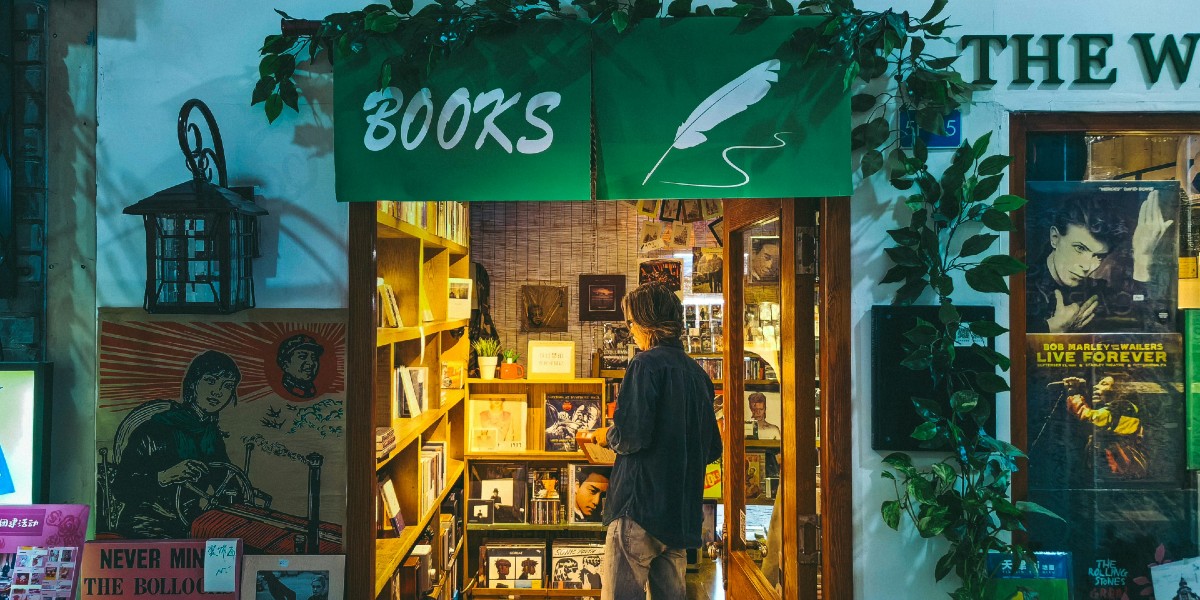Evan Friss is a professor of history at James Madison University.
What’s the big idea?
Bookstores have been “dying” for centuries, and yet, despite their dramatic dwindling, they still hold a central place in American culture. From department stores to indies, the bookstore offers something beyond what any other kind of shop carries. It offers a place to connect, explore, build, and find oneself while losing yourself.
For anyone who cherishes sanctuaries of literature, Friss offers a charming chronicle of bookstores from the distant past and traces their path to a tenuous existence today. History shows the indisputable mark bookstores have made on American life, and the way in which they remain powerful sites of nurturing communities, influencing greatness, and fostering change. What we stand to lose with the shuttering of more and more bookstores is a vital societal concern. With affection and curiosity, Friss explains the timeless relevance of protecting these endangered spaces.
Below, Evan shares five key insights from his new book, The Bookshop: A History of the American Bookstore. Listen to the audio version—read by Evan himself—in the Next Big Idea App.

1. Bookstores have never been more dead or alive.
In 1958, Americans purchased roughly 72 percent of their books from small, single-store, personal bookshops—the kinds that we would call an indie bookstore today. And even as recently as 1993, the U.S. Census Bureau counted 13,499 bookstores (one bookstore for roughly every 19,000 people).
By 2021, however, there were just 5,591 bookstores left (one bookstore for roughly every 59,000 people). Today, the biggest bookseller isn’t even a bookstore. It’s Amazon.com. Whether independent or corporate, whether in New York or New Mexico, bookstores have been disappearing. If bookstores were animals, they’d be on the list of endangered species.
That bookstores continue to endure is, in some ways, something of a miracle. Pundits predicted they would be long dead. So did booksellers. One joked that books have “been a dying business for at least five thousand years.” Nineteenth-century booksellers worried that public libraries would destroy them. In the twentieth century, the bogeyman was the radio, then the movies, then TV, then mass-market paperbacks, and then the superstores. In the twenty-first century, ebooks and Amazon have been the existential threats. The fear that the book business is imperiled—near death, even—has always been an industry staple. In 1887, Henry Holt lamented that “book-stores no longer exist, at least as book-stores. They are toy-shops, and ice-cream saloons” masquerading as bookstores. In 1930, H. L. Mencken asked what could “be done to rescue the poor bookseller,” destined to become a bootlegger or, worse, a chiropractor.
Bookstores may be endangered spaces, but they are also powerful spaces. The ubiquitous image of the quaint bookshop and the be-cardiganed bookseller makes us blind to their power. The right book put in the right hands at the right time could change the course of a life or many lives. And for those who support the quirky, the local, the independent; for those who subscribe to ethical consumerism; for those who crave being blanketed by books and talking to humans about books; and for those who appreciate what’s wanting in online transactions, bookstores have never felt more alive.
2. We are what we read.
What we read is dictated by what authors choose to write, what publishers choose to publish, and what, where, and how booksellers choose to sell. All bookstores are, in a way, institutions that reflect the cultural, intellectual, economic, and political world around them, but they are also actors that cast their own shadows. Any colonial bookstore that sold Thomas Paine’s Common Sense might have been accused of dealing in radical literature. Benjamin Franklin helped stir the revolution, in part from his own bookstores.
In 1834, David Ruggles opened the Antislavery Book Store in Lower Manhattan. Advertisements ran in William Lloyd Garrison’s abolitionist paper, which served as an overt political space for antislavery activists to gather, learn, and plot. Within a year, an arsonist burned it to the ground.
Both good and bad, bookstores have been at the center of political campaigns, shaping our views, thoughts, and politics. The Aryan Book Store was much more than a place to buy some-thing. It was the de facto headquarters of American Nazism.
“Both good and bad, bookstores have been at the center of political campaigns, shaping our views, thoughts, and politics.”
When Craig Rodwell, hardly a big reader, opened the Oscar Wilde Memorial Bookstore in 1967, it was one of the first gay bookstores in the country. Making a profit was always secondary to its real mission: to promote literature that would help gay people feel better about themselves. The bookstore was an intellectual space for thinking and learning about homosexuality, a safe space for people to ask questions and talk openly—maybe even for the first time—about who they really were. Unlike the mail-order businesses that preceded it and the online stores that succeeded it, the bookshop was not just an outlet for the acquisition of gay literature. It was a space that fomented political change and influenced what people read. It was a place where people met friends and lovers. As one writer, in 1981, put it: “Oscar Wilde Memorial Bookshop is one of the pleasures of being gay.”
Being political is also the point at Word Up, a bookstore that opened in 2011 in the Washington Heights neighborhood of Manhattan, known as the “Little Dominican Republic.” Here was a “multilingual, nonprofit community bookshop and arts space” that both reminded its neighbors to fill out their census forms and introduced certain books to a particular population. Outside were books offered as “Pay What You Can.” Inside the bestsellers were For Brown Girls with Sharp Edges and Tender Hearts: A Love Letter to Women of Color and signed copies of Wild Tongues Can’t Be Tamed: 15 Voices from the Latinx Diaspora. The political books selling everywhere else don’t move at all at Word Up.
Today, most of the news stories about bookstores and booksellers and librarians center around censorship and book banning. No matter the perspective, everyone on every side implicitly agrees to the same truth: books hold power.
3. Being surrounded by books matters.
Bookstores stimulate our senses. Sociologists have found that just growing up in a home full of books—mere proximity—confers a lifetime of intellectual benefits. Books offer warmth, comfort, and refuge. It’s no wonder, then, that so many social media accounts deal in what might be called book porn: glimpses of book-stuffed bookstores, libraries, and wood-paneled dens. At the same time, books are imbued with a near holy spirit. Many of us wince at the idea of throwing one in the trash. That’s part of the reason why entering a bookstore can feel like walking into an old church.
It’s the same phenomenon when you walk into a magnificent library. Ask anyone who walks into the New York Public Library in Manhattan, for example, what they feel like doing when they walk up those steps, past the lions, and into the marbled halls. They want to read and write, and maybe they want to be a scholar. Our environments matter.
4. Get off your screen and feel the bookstore.
We can only delight in the sensory experience of a bookstore if we choose to. So, put your phone in your pocket and see, hear, feel, touch, and smell instead.
The physical experience of browsing has surely changed over time. The colonial bookstores were certainly noisy, with the thundering presses and groans of men working them. The books looked and felt very different, too. What did those shops smell like? Well, by and large, customers stank. Soap was expensive. The same clothes were worn over and over. Baths were often once-a-year occasions. Then, there was the scent of ink in the barrels, on the pages, and on everyone’s hands and aprons. The books had a distinctive aroma as well.
“Shoppers are about twice as likely to leave a brick-and-mortar bookstore with a book they didn’t expect to find (or even knew about) than if they browsed online.”
Some people love the scent of a book. It conjures memories of a nose buried in a paperback, the children’s section of the local library, or the aisles of a used bookstore. Some say they prefer the smell of a Penguin paperback (and it must be Penguin). Some think old books smell a bit like chocolate. Others find the smell—possibly dusty, musty, mildewy—offensive. Some lose their taste for it. “The sweet smell of decaying paper appeals to me no longer,” George Orwell, a onetime second‑hand bookseller, wrote. “It is too closely associated in my mind with paranoiac customers and dead bluebottles.”
Inside bookshops, it’s the tables and shelves and lighting that point us in certain directions. So do the booksellers. When we engage with a trusted bookseller, when they tell us to buy this book, we often do. In fact, shoppers are about twice as likely to leave a brick-and-mortar bookstore with a book they didn’t expect to find (or even knew about) than if they browsed online. While the internet retailer knows who you are, where you live, and which books (and electric toothbrush) you’ve bought in the past, the neighborhood bookstore remains an influencer. Why? Because it’s the bookstore and the booksellers that make us feel something.
5. Bookstores are places to lose and find oneself.
The power of the bookstore doesn’t just emanate from the books, architecture, and staff. Customers also make the space. Neither home nor work, these “third spaces” function as critical sites for social and cultural exchange. They nurture existing communities and foster new ones. They are de facto public spaces and gathering spots. They cost nothing to enter. People often just want company.
More so than bars or coffee shops, they are also places to get lost and, by way of the books, to escape reality. For every chatty customer, there’s another who prefers to be left alone. To be by oneself among others. To feel a book’s heft. To smell a paperback’s perfume. To savor slowed time. Part of the joy of bookstores is that they are versatile. They can be community spaces, activist spaces, or political spaces. And they can be places to lose and find oneself.
To listen to the audio version read by author Evan Friss, download the Next Big Idea App today:
































